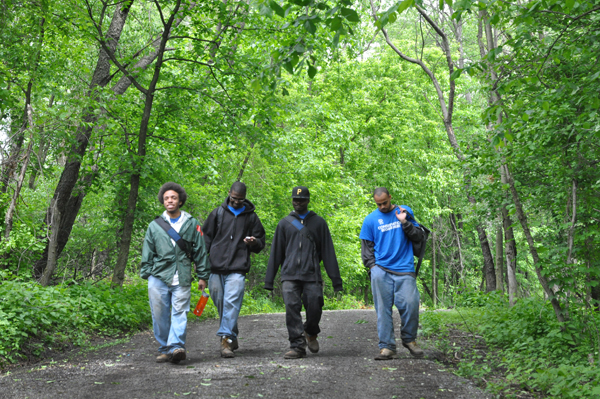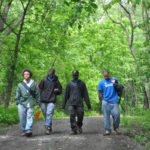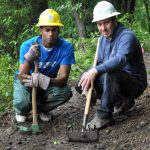
For the Love of Nature: the Student Conservation Association
Walter Burlack sees a love of nature blossom in Pittsburgh’s youth each year. High school students from urban areas, more accustomed to skyscrapers and traffic lights than streams and trails, initially fear the outdoors for its snakes, spiders and other creepy-crawlies.
But after volunteering with the Student Conservation Association, Burlack says, “you see this young person completely covered in mud, just as happy as can be working outside and having a full appreciation for how much fun it is, how healthy it is and how good for our culture conservation work is.”
As the director of the SCA’s Three Rivers Regional office, Burlack manages community programs throughout the Midwest area that provide students with environmental education, green jobs training and conservation service experience in local parks.
“We work in every single park,” Burlack says. “We do trail construction and maintenance, invasive species removal. We do plantings and urban gardens.”
A Pitt and CMU graduate, Burlack developed a passion for the outdoors as a boy in Flickville, Pa. “Having grown up in the country and spending a lot of time outside as a kid, I’ve always been connected to nature and the outdoors,” he says.
Establishing a connection with nature is more difficult for inner city kids, however. That’s why the SCA, a nonprofit organization active in all 50 states, has established programs in major U.S. cities to provide high school students with access to the natural environment and conservation job skills.
While Pennsylvania has a state requirement to provide environmental education, Burlack finds that most schools teach to a test standard and don’t give students the chance to experience the concepts they are learning about first-hand.
“So much of education occurs indoors, in a singular setting,” Burlack says. “And so much of what you want to teach people about the environment occurs outside of that school room.”
Volunteering with the SCA also allows students to explore career opportunities in “green” jobs, a broad field that Burlack defines as “anything from a park ranger to somebody who is installing solar panels.”
“There’s an economy which is evolving which is based on a world that is trying to address climate change,” he adds. “What are the industries that are evolving that are addressing a conservation issue?”
A number of career paths are available for SCA students in sectors like air quality, land management and energy consumption. Some volunteers have become environmental lawyers, environmental education specialists and sustainability directors for cities and communities. Others have gone on to work for the Environmental Protection Agency, the Bureau of Land Management and the U.S. Fish and Wildlife service.
One student considering a career in conservation is Oliver Lieberman, a 16-year-old from City Charter High School. Oliver, who hopes to work in disaster relief or environmental protection with AmeriCorps, has been in the SCA’s year-round program for two years, determining which service projects he works on.
In South Side Park, Oliver recently helped make a drain dip to ease soil erosion and protect plants and streams from sediment runoff. Due to illegal dumping in the park, Oliver and other students encountered and cleared away everything from computer screens to railroad spikes to an old rusted car.
Sometimes, nature comes a little too close for comfort – like when a hungry bear wandered into Oliver’s campsite in Allegheny National Forest. “People were sneaking cheese into the tent,” Oliver says with a grin.
But furry foodie encounters aside, he said that the SCA gives students the chance to step away from urban life and embrace nature.
“I liked going outdoors, but being in the city, I didn’t do it much,” Oliver said. “I think [the SCA] gives us access to wildlife. It teaches us how to integrate people and the environment, and not just bulldoze trees.”
Oliver’s friend Zack Mabe, an 18-year-old from Gateway High School who plans to enlist in the Air Force, agrees. “You learn practical ways to improve the environment around you,” he said. “You might think, ‘oh, I’m doing a lot of work.’ But with all the people, it ends up being a lot of fun.”
“You make pretty good friends,” Oliver added. “I kinda like Zack,” he said with another playful smile.
Oliver, Zack and other SCA volunteers took part in a clean-up effort at the Panther Hollow Watershed in Schenley Park on April 16, in celebration of the 41st annual Earth Day later in the month. They planted trees, removed trash and invasive plants, and planted native species of plants that animals rely upon for food.
Along the trail, Burlack and Josh Nard, the SCA’s program coordinator, pointed out simple, cost-effective solutions that better the environment.
“Invasive species – Tree-of-Heaven, Norway Maple, mustard plants – block and take over the native species,” Burlack said. “It can change the environment really quick.” Volunteers removed those invasive species and planted native species, like Red Bud trees.
Nard tapped his foot on a large log that serves as a cross-slope trench, intercepting fast-running water and sediment that could pollute streams. “Thousands of dollars in damage prevented by that,” Nard said.
The SCA has seen a steady increase in participation both locally and nationally, Burlack said. “There’s a high sensitivity with a lot of folks in Pittsburgh who want to have a clean, healthy environment where they can enjoy themselves,” he said.
“Our whole thing is to engage the student in service,” Burlack said. “This is a call to action. We want to engage as many young people in conservation service as we possibly can, and we want to show that young people have the ability to make change. They are a positive resource for the city.”
Captions: Walter Burlack; (l to r) Jared McRay, Nate Thomas, Stuart Townsend, Chris Smith; Lynell Guyton; Lynell Guyton and Thomas Guentner; Jared McRay Thomas Guentner.
Photographs copyright Brian Cohen




